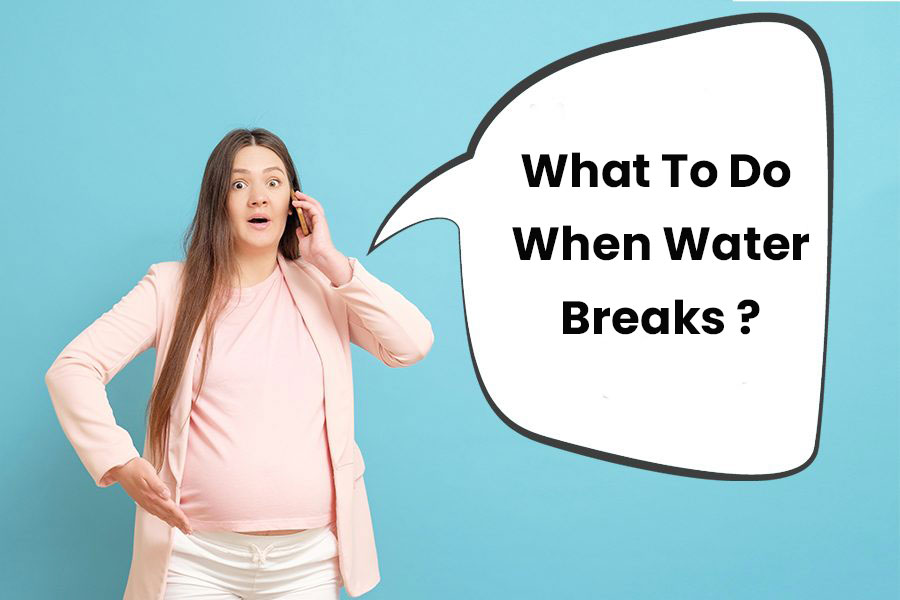Is delivery imminent when your water breaks?
When you’re pregnant and your water breaks, it means that the fluid-filled sac around your baby has ruptured. This sac of amniotic fluid keeps your baby safe and secure inside your womb. It’s also known as a water bag because it provides space for your baby to grow, maintains a consistent temperature, and cushions the umbilical cord so it won’t get squeezed.
Your water breaks and empties through your vaginal opening as your body prepares to deliver the baby. This can occur either before or during labour. When your cervix thins and widens to allow your baby to get through, you’ll start to feel contractions.
Prelabor rupture of membranes occurs when your water breaks before your contractions begin (PROM). In reality, approximately 10% of full-term labourers begin this way. It can even happen after labour has started.

Signs that your water breaks during labour
Everyone experiences it in a different way. You may have noticed:
- A sudden flow that makes you feel like you’ve peed your trousers.
- A constant leak
- A slow drip
- A leak that appears and disappears.
- A slight pop may be heard or felt.
When water break occurs, it warrants an immediate visit to a gynaecologist.
For any Gynecological emergency
Visit: Dhanvantari Hospital Borivali – Gynecology, Maternity, Nursing Home & Multispeciality Hospital in Borivali
Dhaval Apartment, Factory Lane, Near Railway Station, Borivali West, Mumbai, Maharashtra 400092
Call: 9324263464
Early Water Breaking
Only about 3% of pregnant women experience a water break before the 37th week. This is known as preterm prelabor membrane rupture (PPROM). If you do the following, it’s more likely to happen:
- underweight baby
- Had a PPROM with an earlier pregnancy
- Have an untreated urinary tract infection
- Had vaginal bleeding at any time during pregnancy
- Had problems with your cervix during pregnancy
- For PPROM, you should go to the hospital right away.
If you’re at least 34 weeks pregnant, the doctor may want you to give birth to lower the odds that you or your baby will pick up a serious infection.
It’s normally advisable to postpone birth if you’re 23-34 weeks pregnant, so your baby has more time to grow. Antibiotics will be given to you to help prevent infection, as well as a course of steroids to help your baby’s lungs mature faster. You may stay in the hospital until you give birth.
If your water breaks before you reach 23 weeks, your doctor will discuss the risks and advantages of continuing the pregnancy with you. Babies born following an early water break have a lower chance of survival. Those who do are more prone to suffering from mental or physical disorders.
How will I know if my water has broken or if it’s a urine leak?
Urine leakage might become more common in the third trimester as your baby becomes bigger and puts more pressure on your bladder. It’s easy to confuse a urine leak with a burst membrane (stress incontinence).
Your doctor may have advised you on what to expect after your water break. The following are some of the things to watch for in leaking fluid:
Flow-A sign that your water has broken is that you can’t stop or regulate the flow once it starts. If you’re continuously leaking clear and watery fluid, it means that your membranes have ruptured.
Odour-Amniotic fluid, unlike urine, should not have an ammonia-like odour. It’s also different from vaginal discharge, which can become extremely heavy as you get closer to labour and has a musky smell.
Colour– it’s usually transparent with a yellow tinge or, if there are remnants of blood, a pink tinge. If you’re close to or past your due date, your waters may contain some of your baby’s first fecal matter (meconium). This may cause the water to turn green, or you may notice green or brown meconium. This could be a symptom of foetal distress, and you should contact your doctor immediately.
How Long Will Contractions Take To Begin?
Contractions may or may not begin immediately after your water break. Some women may experience a ‘period pain’ sensation that intensifies and leads to contractions.
Some women will wait for hours after the waters break before they feel any contractions. In most cases, contractions will start within 24-48 hours after water breaks.
If you feel any water breaks and vaginal discharge during pregnancy contact your gynecologist immediately to avoid pregnancy complications.
